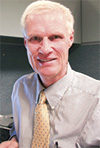In this column, I have often written that the best investment we make is an investment in people. Specifically, helping them understand the importance of bringing meaning to their lives. For those choosing public service, the meaning is service to others, empathy for those less fortunate and compassion for those stuck in a life void of self-determination and opportunity.
This is the story of a young man in South Sudan. And the investment of enlightenment for him and those he serves.
Mr. Francis Ochaya Felix is an employee at the Eastern Equatoria Ministry of Agriculture in Torit, South Sudan. He is a seed specialist with a university degree in botany. He is married with three children. His fourth child died of typhoid during my tour in South Sudan last year. Francis and his wife are in their early 30s, and both speak fluent English and Arabic.
During my many weeks in Torit, Francis and I discussed how the ministry can support and enable the small landowners, mostly women, who have a plethora of foreign assistance from non-government organizations (NGOs), church-based organizations (CBO) and the United Nations (UN). I have written about these discussions in earlier articles.
Francis clearly understood that the entitlement program was deeply flawed. The consequence of handouts is, of course, enslaving those to someone else with little opportunity for self-determination.
He would say the greatest challenge at the ministry is finding a relevant purpose for the 30 or so public employees in the face of the many foreign aid groups. We often talked about the relationship between entitlement and empowerment.
At the end of my tour, last summer, Francis told me he had the opportunity to attend a university. A grant had been secured for his two-year study so that he could earn a master’s degree in seed physiology.
Today, Francis is finishing up his first semester at Makerere University in Kampala, Uganda. His studies are paid for by a grant from one of the many NGOs in central Africa. In his case, the Alliance for Green Revolution Africa or AGRA.
He has asked for some peer-reviewed literature on the topic of the bruchid beetle, a quarter-inch-long organism that damages and destroys legume seeds such as cowpeas and lentils. Their eggs are deposited in the seed pod and, when they hatch, use the legume seed for food.
This organism is particularly manifest in western and central Africa. Francis is learning all he can about its control, both biological and chemically, so the valuable legume seeds, especially cowpeas, are no longer infected and thus capable of germination. A tall order, indeed.
When his studies at Makerere University are complete, Francis returns to Torit with the task of implementing what he has learned. We know that an investment in people, like these two years of study in Kampala, will result in a return on that investment.
Francis has a position with the ministry upon his return in 2014; his supervisor, Minister Mark, will provide the tools and the support to begin figuring out how to control these bruchid beetles. Landowners of all sizes will gain by having better-quality seeds, in this case mainly cowpeas, which helps increase the amount of food grown.
U.S. taxpayers are helping pay for this young man’s education. Unlike an entitlement program, this one empowers Francis to gain knowledge, seek understanding and eventually implement a program for pest control. In every expeditionary assignment, it is such an investment in people that returns the greater good for our aid investment.
I have also written that the investment in education is just the start. We go to a university to learn how to learn but not for the sake of intellectual enlightenment.
We do so to go into the world and put this education to work, helping solve a problem or mitigate a malady that constrains people from a better life. In this case, the constraint is food insecurity.
We know the next step is hugely important. Francis returns to Torit and he will have the tools and the support of his ministry to implement control practices in the field. Yes, much of this control will be done in the private sector – and my guess is Francis may even find himself working for one of them, a seed company, for instance.
A mistake, in my opinion, is bringing young men and women to a university – in Africa or Europe or the U.S. – without answering the question: What happens when they go home? We answered that question with a commitment from Minister Mark.
As of this writing, Francis is back in South Sudan enjoying Christmas break with his family. In early January, he returns to Kampala for his second semester of study.
Very often, the work we (the U.S. government) do as foreign aid comes under a lot of scrutiny, and it should. Nation building anywhere outside of CONUS (continental U.S.) is expensive, as we have learned in Afghanistan, Iraq and, for decades, in Africa.
My point is: If we can shift our aid programs towards investments in people like Mr. Felix, along with a commitment by the host government to give them the tools, the budget and the support to actually implement that knowledge towards helping society, then this is a far better model than building structures or handing over equipment to the host government.
No doubt some of our support will be required to help support those public servants once they are back at their duty station. Many times during my deployments, I found the lack of money for supporting those we had trained – or someone else had trained – was a constraint that could not be overcome.
Certainly one of the most frustrating outcomes is engaging in training a government public servant only to have them return without the mandate to use that training.
I submit much of the unrest in the world today is rooted in the lack of opportunities, especially for a young person who has gone to a school and received training but who cannot find a job or engage in the altruistic work of helping the very society they come from. Francis is fortunate; he has this already worked out.
The difference between entitlement and empowerment is big in much of the world. Rethinking our approach at aid is dearly called for. I am suggesting that the outcome we should be seeking is the investment in people that shifts their behavior towards empowerment, self-respect, determination and dignity.
I am not convinced we will move toward this model any time soon. Giving people “stuff” as outputs is easy and we feel good doing so. But what happens when this “stuff” is no longer available? Our soon departure from Afghanistan is cause for concern given that the pipeline of stuff will soon end. What comes next?
For every Francis in the world, there are probably thousands of those without these kinds of opportunities. Let’s change that. We can if we just examine the reason why the U.S. is a country almost everyone seeks to live and work in. Empowerment and self-determination yields to living a meaningful life.
And this, then, is the story of successful societies that have become enduring civilizations. PD

Mike Gangwer
Agricultural Scientist
USDA-NRCS



